Murad Abdul Jalil | Ali Darwish| Nour Aldeen Ramadan
Majdi and his family, who fled al-Qalamoun area in Damascus countryside in March 2018, left their house in Afrin on a visit to Idlib for ten days. Their short stay in Idlib was enough to make them lose all their furniture, even their food items.
Majdi (who requested to use a nickname for him for security reasons), said that members of the “Syrian National Army” (SNA) have raided his home in his absence and stayed there for a couple of days before taking all his belongings, according to his neighbors’ narrations.
Majdi added “the neighbors have told them that we are displaced refugees on a visit to Idlib…but no body listened”. He confirmed that his family is once again without furniture or food”, like when they were displaced before, “with only a slight difference …we have a roof over our heads this time.”
His complains to security authorities in Afrin were in vain. When he insisted, the interested authorities told him that they have called the group of fighters in question for investigation, but they were on military mission. Consequently, the investigation will be held after its completion. After several attempts, no follow ups have been made by the security authorities in Afrin, which prompted Majdi to lose hope.
Majdi’s story sums up some of the violations by some factions of the “SNA” in the northern countryside of Aleppo and areas recently captured under its control in the countryside of Raqqa. In addition to several arrests and clashes causing causalities among civilians.
In this investigation, Enab Baladi monitored some of the most prominent violations by members of “the Syrian National Army” (SNA) in the region. It also tried to shed light on the causes behind these violations and the role of “the Syrian Interim Government” (SIG), particularly its leaders and Turkey, known for its support to “SNA”, in the provisions of solutions
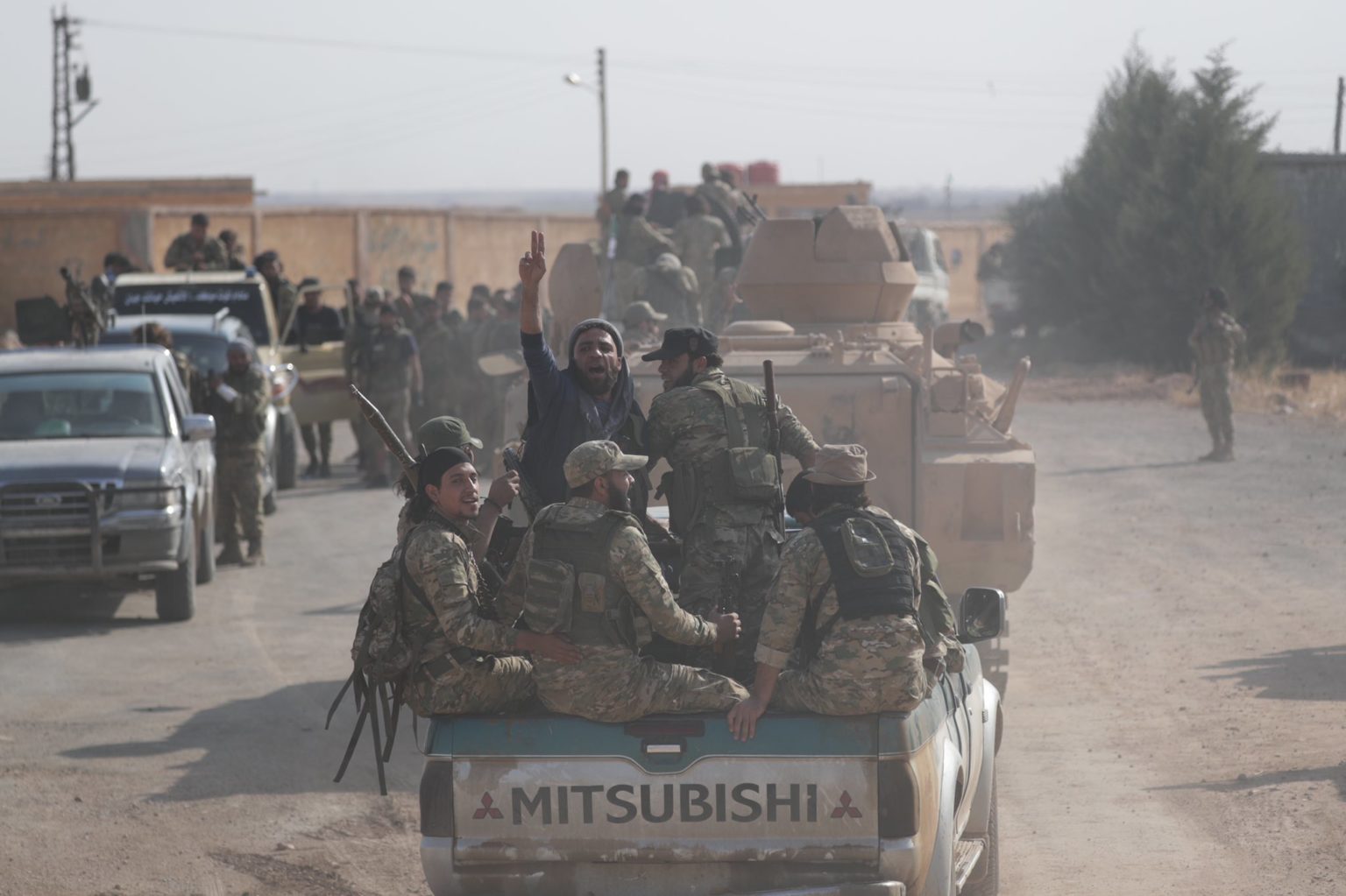
Members of the Syrian National Army (SNA) in the “Spring of Peace” operation in the east of the Euphrates – on 7 November 2019 (khalelashawe)
Violations in the Syrian North opens the door for rivalry
Who is responsible…”SNA” or its factions?
Many clashes between the Syrian National Army’s (SNA) factions, backed by Turkey in northeast Syria, took place repeatedly, which demonstrate that their unity under the same military entity, is not at it seems.
Since last March, Enab Baladi monitored five clashes between factions of “SNA” in many areas under the “SNA” ‘s control in the countryside of Aleppo, while another one took place in Tell Abiad, in the northern countryside of Raqqa.
The first of these clashes occurred between “Ahrar al-Sharqiya” and “al-Shamia Front”, at the Tell Abiad at the gate border crossing with Turkey in the northern countryside of Raqqa. Meantime, both factions did not provide any clarifications about the clash.
Twenty days later, fights took place between the special police (commandos) affiliated to “SNA” and two other members of “Ahrar al-Sharqiya”, in a market in al-Bab city eastern Aleppo leading to the killing of a member of special police.
These clashes took place when the streets in al-Bab city were evacuated by the special police commandos following the decision of local institutions to close markets. This step was part of the implemented precautionary measures to curb the spread of the novel coronavirus (COVID-19).
Al-Bab city clashes ended by reconciliations with the presence of military leaders, clan dignitaries and religious figures in the city. The said agreement stipulated releasing arrested members during these clashes by both parties, while handing check points previously controlled by “Ahrar al-Sharqiya” to commandos.
Meantime, the third dispute was between members of “Ahrar al-Sharqiya” and “20th Division “, which started at “the Aoun al-Dadat” crossing point separating the “Syrian Democratic Forces” (SDF) from opposition held-reas, on 30 of last April and ended on 2 of last May. The clash reached Jarabulus city and witnessed the involvement of many factions of “SNA” in addition to “20th Division” fighters. Later, the fighting stopped until signing a reconciliation agreement on 14 of last May, in al-Bab city and thus put an end to raising tensions there.
Later, several violations and clashes took place successively between other factions, most prominently between “Hamza Division” and “al-Shamia Front” in al-Bab city in the countryside of Aleppo. Tension between both parties raised over smuggling operations, leading to the killing of two civilians, including a woman, while others were injured.
Another dispute arose between “Hamza Division” and some displaced people from eastern al-Ghouta in the countryside of Damascus at the end of last May, after members of the division threw a hand grenade on a shop because the owner refused to serve them.
Enab Baladi also monitored, in the last period, many arrests among civilians by “SNA” in the countryside of Aleppo, additionally to the confiscation of properties which were rented in exchange for “royalties” in Afrin region in the northwest of Aleppo.
“Syrians for Truth and Justice” (STJ) organization has documented 43 arrests last April in Afrin region by both “SNA” and security services. Later, 30 detainees were released after their families and relatives paid ransoms or bails, while the rest were transferred to other detention centers or other district headquarters and their faith still remains unknown.
Meantime, the Syrian Network for Human Rights (SNHR) has also documented 405 arrests among civilians by the armed opposition factions (SNA), including 20 children and 19 women, in 2019.
All these violations and clashes, along with the public resentment which was translated into protests and demands calling these factions to leave their villages and town, have prompted the search for those responsible for not institutionalizing the work of opposition factions.

Members of the Syrian National Army (SNA) in the “Spring of Peace” operation in the east of the Euphrates – on 13 October 2019 (khalelashawe).
“SNA” …lack of institutionalization
On 4 October of last year, a group of military leaders of the Syrian opposition were seen in the Turkish city Şanlıurfa, near the Syrian borders. Later they announced the formation of what is called now “The Syrian National Army” (SNA) under the leadership of the minister of defense in the (SIG) and former chief of staff, Salim Idris.
Back then, the formation was welcomed with joy by a wide range of Syrian regime opponents, especially that it came after eight years of repeated calls to put aside all differences and be united under a single military entity. This military entity is supposed to be in face of all military developments on the Syrian arena and in face of Syrian regime forces backed by Russia and Iranian militias.
Despite all promotions concerning “SNA” being “a single military entity”, it still has weaknesses in its central command and failed to police and curb violations and abuses. The entity also lacks a military establishment which can impose and execute decisions on all factions under its command, according to several military analysts and official within “SNA”, who were interviewed by Enab Baladi about the reasons and the main and direct responsible for policing these violations.
Most analysts agreed that the last factions’ violations can be attributed to many reasons, some have to do with “SNA” itself and its poor structure and leadership. While others are linked to the methodology and nature of the factions amid an absence of a central authority as well as the international position regarding “SNA” and its refusal to transform it into a large military institution.
In its newest form the “Syrian National Army” includes both the “National Army” established in 2017 along with the “National Front for Liberation” (NFL) formed of 11 factions of “the Free Syrian Army” (FSA) in Idlib governorate in May 2018.
Following the last merging process seven months ago, the new form of the “SNA” consisted of seven military corps; three of the old “SNA” while the rest belonged to “NFL”. Meantime, he number of fighters exceeded 80 thousand fighters, according to early announcement by the “Syrian National Coalition” (SNC).
Analysts: “merely a name”
Military analyst, defected colonel, Ziad Hajj Obeid, thinks that despite the merging of these military corps, the entity did not witness a significant interaction and still in progress without a major role. He added that “the National Syrian Army is merely a name while its effectiveness is less than 50 percent.”
The colonel, who is residing currently in Turkey, faulted “the Syrian Interim Government” (SIG), its prime minister and some ministers especially the defense minister and the minister of interior as well as the “Syrian National Coalition” (SNC), which is the political front, for the chaos striking some areas in the Syrian north as well as for the violations which take place there.
Military analyst, retired Major General Mahmoud Ali, who lives in Turkey, blamed Syrian opposition with both its political and military sides along with its supporters for preventing the establishment of real institutions affiliated to the Syrian revolution. He explained that “this was done to curb its victory and drive it toward different directions to divert it from its primary goals, which can be proved throughout the previous years.”
In his talk to Enab Baladi, the retired Major General pointed out that “the Syrian opposition wrecked both military institutions: ministry of defense and ministry of interior. He proceeded by saying that opposition did not include defected officers from the regime’s army, police apparatus as well as security services in real organizations and institutions. Consequently, destroying the principals of military institutions, military hierarchy, professionalism and expertise, and used unprofessional persons instead, to finally reach the current situation.”
Ministry of defense, Major General Salim Idris, has announced earlier the existence of a plan to organize the “SNA” and move it from the current statue to what he described as “a full military statue”. In an interview with the “Moral Guidance” on 5 of last May of the current year, he said “the plan will be implemented in coordination with leaders of other formations and leadership of different ranks,”. He added that “efforts and work done by leaders and fighters in the current formations of “SNA” will be taken into account while moving to the “full military statue.”
the army responds…what are its problems?
To receive an answer about the role of “SNA”, Enab Baladi had contacted former chief of staff and minister of defense in “SIG”, Salim Idris, who refused to make any announcements of any kind at the current time. Enab Baladi also tried to contact military leader of three military corps affiliated to the “SNA” but no response to these inquiries was received.
As for the director of the “Moral Guidance” in the “SNA”, Hassan al-Daghim, while answering a question about the “SNA” problems and its structures, he confirmed the absence of a central authority and the weakness of “SIG”. He also talked about failure to restructure both the ministry of interior and defense and all factions entirely, adding that most factions were brigades before transforming into military corps. Hassan al-Daghim pointed out that this matter needs a temporal context with its challenges and pitfalls.
“we cannot say that we have reached an excellent status of institutionalization in the “SNA”; however, at the same time we cannot it consider merely a name without a role,” according to al-Daghim. He explained that this can be attributed to the presence of a military judicial department, a military police department, a chief of staff committee, a department of “ Moral guidance ”, civil and military courts, in addition to periodic meetings held by “ SIG” government ”and leaders of “SNA” which adheres to the former’s general policies.
According to al-Daghim, “the Syrian National Army has not issued any political statements in the past nine months, and it is the (SIG) and Syrian Coalition (SNC)’s mission now to issue such statements, which is a sign of institutionalization. He added that whenever the Moral Guidance wants to share any views about a matter out of its competence, it has to go back to the minister of defense.”
He added that “matters of peace and war, starting a battle and ending it, providing support to fronts, are all conducted through the administration of a unified staff command”. He also confirmed that the aim of the command in the near future is to structure groups where a leader of one group is also the leader of all brigades under his command.
Several ideologies… “are the factions the one to blame”?
Next to the weakness of the central command, there are many reasons which can increase the number of these violations; some are linked to the precarious living conditions while others have to do with different ideologies and allegiances of factions.
Director of “Moral Guidance” in the “SNA”, Hassan al-Daghim, identified additional reasons to the occurring clashes between factions. First, he talked about forced displacement and the arrival of thousands of civilians and fighters to areas northern Syria. This imposed a different reality on the ground as a result to many components whether tribal or regional, along with the difficulty of social integration.
Many factors contributed to this, such as the poor standard of living, the current low level of per capita income, lack of a good educational system as well as the absence of cohesive families and schools. Additionally, to the enrollment of uneducated fighters in factions, disruption of productions, while the majority of people depend on humanitarian aid. All this led to “an increase in the rate of unemployment, which is half the vice.” as al-Daghim put it.
Among the reasons identified by the director of “Moral Guidance”, include fighters lack of understanding the law itself, while some of them think they represent authority, and this needs sometime according to al-Daghim. He explained “any rebel fighter carrying a weapon standing on a police checkpoint, needs sometime to realize that the police represent the law.”
He added that defining law is done through awareness programs, lectures and codes of conduct which help fighters understand that both the military and civil institutions has a mandate on them, the same can be said about judges who have jurisdictions. They also need to understand that they are part of a government with political treaties and agreements which they should adhere to. It might take sometime to shift from “a mindset that believes only any revolution to another one that adheres to a state of institutions and believes in the structuring of security institutions as well as the legal force and immunity these institutions require.”
Meantime, colonel Ziad Hajj Obeid attributed the occurrence of clashes between the different factions to “intellectual diversity” in the northern countryside, where different segments of Syrians from different governorates. In addition to “an absence of coherence and homogeneity between factions under a single military leadership and political front for the revolution, created a kind of competition between certain regions, as well as rivalry and struggle for money and material gains.”
Military analyst, Major General Mahmoud Ali, stressed lack of discipline within factions and the existence of violations as a result of being controlled by unprofessional leaders instead of experienced officers. He explained by saying that “we respect their revolution but they lack any sort of internal or external discipline, additionally to the fact that their aims are purely related to personal gains and allegiances that have nothing to do with the revolution. This will have drastic setbacks in the future, which will probably raise the public resentment against them to expel them later from those areas.

Members of the Syrian National Army (SNA) in the “Spring of Peace” operation in the east of the Euphrates – on 7 November 2019 (khalelashawe).
Punishments have limits…for every faction there is a judge
Who is going to punish who?
The number of these violations by factions raises many questions on whether they are entities to hold them accountable or not. The absence of accountability and control will lead the members of these faction to commit more offenses and violations while its presence may improve security in the region.
The director of the “Moral Guidance” Department in the “SNA”, Hassan al-Daghim confirmed to Enab Baladi the existence of an “accountability authority” within the “SNA”. He added that there are “about 750 prosecutions and active cases in the military judicial department, and about 850 criminals and drug dealers in prison. In addition to more than 400 members, affiliated the “SNA”, who were arrested for criminal offenses, misdemeanors or malfeasance.”
There are six departments of “military courts” affiliated with the “SNA” distributed on al-Bab, Jarabulus, Azaz, Afrin, Jindires and Rajo city, according to al- Dughaim. There are also three investigative judges and a Criminal Court in Azaz city under the supervision of a Deputy Dean and a colonel in addition to a military prosecutor’s office newly established three month in Ras al-Ayn city west al-Hasakah city.
What is the highest form of punishment?
Enab Baladi had also contacted military judge in Jindires, Salah al-Suleiman, who said that all courts receive complaints from both civilians and military personnel. These courts refer those arrested for investigation to the military police while defendants are referred for prosecutions. However, whether they arrested or not, depending on their crime, they people tried under the provisions of the Syrian Penal Code and the Code of Criminal Proceedings.
He confirmed that after issuing judgments which are reviewed or ratified by a military public prosecutor before sending them to the military police for execution and arresting convicts. Military judge, Salah al-Suleiman pointed out that at the present moment they suffer from not carrying out death sentences being a deterrent punishment because they are not eligible to do so. He proceeded by explaining that according to law, for a death penalty to be executed it requires to be admitted by the President of the Republic. Consequently, most of death row inmates remain in prison waiting for the execution of their sentences, referring to 50 death sentences issued by Azaz public prosecution office waiting for execution.
Do Factions govern their fighters?
Military judge in Jindires, Salah al-Suleiman, thinks that there is lack of organization within military factions, while he criticized their response to execute judgements and the weakness of judgement notes. He explained to Enab Baladi that the execution of judgement notes and provisions is done through the military police which “ faces obstructions and lacks response and the extradition of wanted criminals to avoid collision with factions. Sometimes, these factions help wanted criminals to escape and declare later dismissing them of their ranks. In such cases, courts are forced to conduct trials in absentia and publicize court judgements in hope of arresting criminals.”
According to al-Suleiman, these factions have internal judiciaries to prosecute violators according to their own norms, upon which they refuse to extradite wanted criminals to military police under the pretext of being arrested for security reasons. Moreover, a faction can arrest defendants for several months or even years without conducting fair public trials which enable them from appointing lawyer for their defense. While some of those arrested are released without completing their sentences. Additionally, those who conduct trials and those being tried have often no prior knowledge or expertise in judiciary. They are also not familiar with the process of documentation and the preservation of crimes weapons, documents and archiving.
Al-Suleiman believes that the solution to all of this lies in an active role of the “SIG” and the ministry of defense, through obligating all factions to control and police their members under a unified army which adheres to laws and regulations, and respond positively to judiciary.
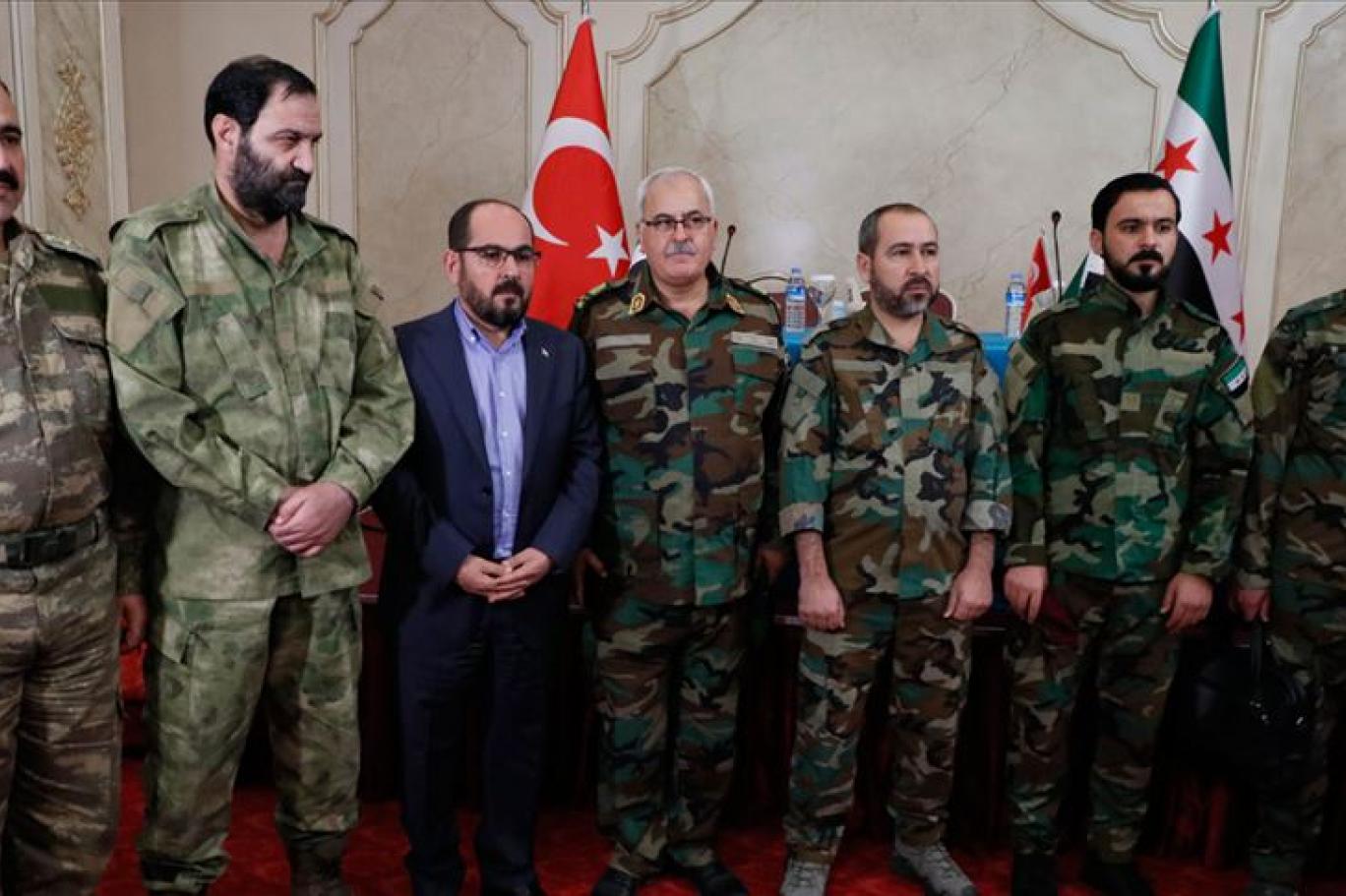
Leaders of factions loyal to Turkey during the declaration of its unification and the formation of the Syrian National Army (SNA) – on 4 October, 2019 (Anadolu Agency)
Several violations
Commander of military police in Jindires district in the city of Afrin, Major Ibrahim al-Jassim, confirmed that the number of violations and attacks on civilians is “huge”. In his talk to Enab Baladi, he said that “the military police is following up on any secret or public complaints from residents through monitoring.”
He added that the military police are currently executing many procedures which include conducting campaigns to raise awareness among fighters as well as the extradition of certain members to military courts. Meantime, fighters are not allowed to keep arrests in detention for more than 48 hours. He noted that 107 incidents have been recorded in Jindires district and its villages since the police started operating there.
Enab Baladi also learned from a soldier and a former leader of a faction, (Enab Baladi has reservations about publishing name), that a Turkish-Syrian security establishment, which operates in “SNA” controlled-areas in the east of the Euphrates, but it is not affiliated to this later, chases violators and documents their misconducts. Meantime its mission is to arrest criminals and transfer them to military courts for prosecution.
Enab Baladi’s source did not mention the number of arrests, but he confirmed that is “significant”, pointing out that Turkish-Syrian security establishment is still operating there to stop these violations and maintain the real aims for which these factions were established in the first place.”
Turkey… the present absentee
When talking about opposition from a militarily side, the Turkish role cannot be ignored being the first supporter of “SNA” factions and responsible for the region and its security before the international community. Turkey is also one of the guarantor countries of “Astana” talks alongside Russia and Iran which provide support to the Syrian regime.
Turkey has been accused multiple times of inaction concerning the structuring of “SNA”, and was faulted for choosing ineffective military leaders, as well as the many problems which are still unsolved to this day, according to military analyst, Ziad Hajj Obeid. The military analyst considered that the big number of those working on the Syrian file as well as the diversity of their views and opinions under a real and a unified vision have led to several problems.
However, Hassan al-Daghim, director of “Moral Guidance” department in “SNA” considered that the Turkish position supporting factions “contributed to their unification under a single body, and gathered more than 45 leaders. In addition to providing funds, as well as holding those accountable for corruption and theft.”
However, Hassan al-Daghim, explained that “Turkey does not control the world”, as “Russians has drawn redlines concerning its moves, they also threatened to blow up the Astana and Sochi agreements and to allow Iranians to invade the region in case Turkey provided support for “SIG”, the “SNA” or any other component in the Syrian revolution. Consequently, this may prompt Turkey to make certain concessions.”
An opinion poll
Al-Daghim thinks that “having a national army and a single government is in the interest of Turkey and the Syrian opposition; however, there are attempts to hamper Turkish efforts in the region, in order to rehabilitate the Syrian regime.”
برأيك..
من يضبط انتهاكات الفصائل في مناطق سيطرة الجيش الوطني؟
Posted by جريدة عنب بلدي Enab Baladi on Tuesday, 2 June 2020
What are the possible solutions?
Amid all these clashes and disputes between factions, and their consequences, which include losing public support; it is necessary to find drastic and quick solutions for these problems which may led to more of fragmentation and disintegration, according to colonel Ziad Hajj Obeid. He thinks that the first of these reforms must be within the “SNC”, followed by the “SIG”. In addition to the formation of a unified military body which leads all factions and adopts clear mechanisms of work.
Obeid stressed on the importance of giving a role to civil institutions, the police and the military judiciary. He also emphasized on the incorporation of former experts, leaders, thinkers and politicians as well as military personnel and used their expertise to overcome this difficult phase, stressing the necessity of ensuring the independence of institutions.
For his part, the director of the “Moral Guidance” Department in the “SNA”, Hassan al-Daghim, stressed on the role of “SIG”, mass media as well as educational lectures on code of conduct set by the “SNA”, where “a thousand copies were printed and distributed on various checkpoints. Moreover, more than 150 rounds and 30 sessions were carried out by 100 mentors in the moral guidance, under the aim of explaining the code of conduct and how to implement it.
However, the first step to do that according to “al-Daghim” is by “filling void” and reforming the army’s structure. This can be done by setting a plan of reforms to include all departments and staff officers, the military police, the “Moral Guidance” as well as laws which regulate sorting, appointments and salaries, otherwise “things will remain the same, without a fixed plan. ”
if you think the article contain wrong information or you have additional details Send Correction
النسخة العربية من المقال
-
Follow us :
Most viewed
- Saudi Arabia to prosecute sheikh Saleh al-Shami and ten Syrians in May
- Hidden aspects of Iranian consulate building targeted in Damascus
- Liwa al-Quds mourns 22 members following attack on military bus in Homs countryside
- Israeli strikes target military airports in southern Syria
- Samir Geagea: 40% of Syrians in Lebanon are "illegal refugees"


















 A
A
A
A
A
A




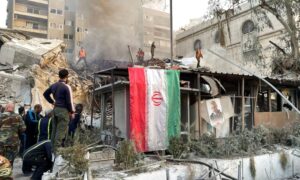
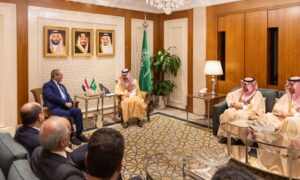
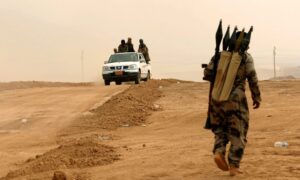
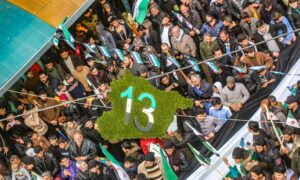
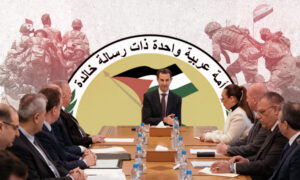
 More In-Depth
More In-Depth